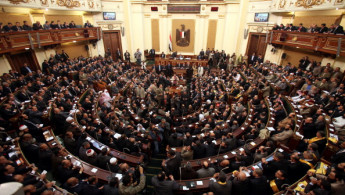Egyptian law grants syndicates judicial powers over artists
CAIRO: In a move that sparked the outrage of artistic freedom advocates, the parliament’s culture and media committee approved Tuesday a law amendment that gives the three syndicates the right to crack down on artistry they described as “substandard”.
The law was passed after a meeting between committee members and Hany Shaker, veteran singer and head of the musicians’ syndicate, who has called songs of the ‘mahraganat’ genre "rubbish."
Mahraganat is a form of pop music deemed contentious due to its use of slang and mention of alcohol and drugs.
While at the helm of the musicians' syndicate, Shaker has crusaded against mahraganat, rap, and other genres.
Though the syndicate banned mahraganat altogether in Egypt in February 2020, songs of the genre have continued to garner millions of views and listens from Egypt and across the Arab world on YouTube and streaming platforms. Earlier last week, the musicians' syndicate blacklisted 19 mahraganat singers, banning them from singing at all public venues.
The law also grants the cinema professionals and actors' syndicates judicial powers to stop performances, but it remains unclear how the law will be applied.
Opponents say the law is part of a wider shutdown of free expression in Egypt.
“Passing such a law represents a general trend followed by the state to control and censor all aspects of the society, not just art, given the fact that the parliament is loyal to the government,” renowned film director Daoud Abdel-Sayed told The New Arab.
“It is a continuation of the same policy. It’s not just about suspending singers or artists. Rather, it has to do with the public being banned from exercising their right to choose what to watch or listen to,” Abdel-Sayed said.
“At the same time, such a move curbs creativity, imagination, and artistic freedom, which in turn has a negative impact on artists and the society at large,” he added.
Khaled El-Balshy, former head of the freedoms committee at the press syndicate, agrees with Abdel-Sayed.
“It’s part of the general context we are surviving. The idea is to be in control of what people watch and hear. The society should be featured by diversity,” Balshy told The New Arab.
“The role of these syndicates is to defend the rights of their members and their works not to nail them. The new law mixes up their job with the those of the judiciary and the executive authorities by undertaking penalties and setting boundaries for artists that they can’t overstep,” he added.
Prominent human rights lawyer Mohsen Bahnasy argues that the law is “unconstitutional”.
“The law violates the constitution and freedom of speech in the sense that it gives ordinary individuals legal authorities to catch others red-handed only because they disagree with them,” Bahnasy told The New Arab.
“It’s as if, from now on, Hany Shaker will move around in the city with handcuffs in his pocket to arrest any artist who violates rules only set by him,” he said sarcastically.
Based on the Egyptian constitution, “the freedom of artistic and literary creation is guaranteed…[whereby] no lawsuits may be initiated or filed to suspend or confiscate any artistic, literary, or intellectual work, or against their creators except through the public prosecution.”
Mixed reactions on social media
The parliament’s move sparked mixed reactions on social media.
Supporters said the move would preserve cultural integrity.
|
TRANSLATION: “The parliament gave judicial powers to artistic syndicates to confront ridicule and maintain the public taste.”
|
TRANSLATION: “All gratitude and appreciation to the media committee of the parliament led by Dr Doriya Sharaf Eddin [who] agreed to grant judicial control to the artistic unions in order reduce [devastating influence] ‘mahraganat’…we want to have the artistic spectrum purged.”
Critics, some using humour, warned of a slope towards authoritarianism.
|
TRANSLATION: “They are distributing judicial powers just like bonbons. I’m worried to wake up finding…the doorman, arresting me on the charge of snoring in my sleep.”
|
TRANSLATION: “The commission for the promotion of virtue and the prevention of vice had been called off in Saudi Arabia and was moved to Egypt. Bit by bit…they will detain people and beat them up.”





 Follow the Middle East's top stories in English at The New Arab on Google News
Follow the Middle East's top stories in English at The New Arab on Google News


